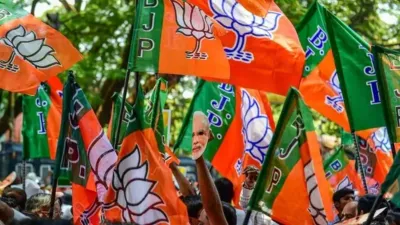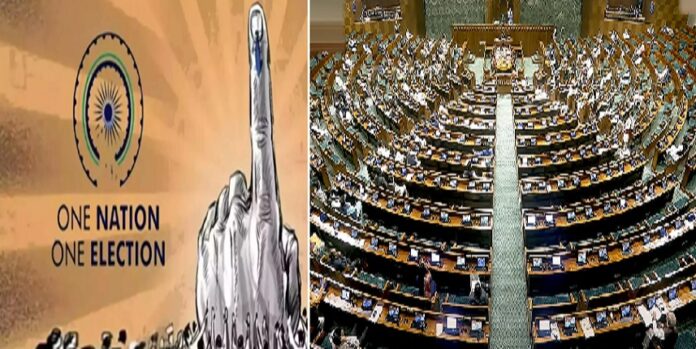One Nation, One Election Bill voting on Tuesday turned contentious as the BJP decided to send notices to 20 Lok Sabha MPs who failed to attend, despite a three-line whip issued by the party. The absenteeism has sparked disciplinary action within the ruling party as two crucial bills paving the way for simultaneous Lok Sabha and state assembly elections were introduced in the Lower House.
BJP Takes a Tough Stand
The Bharatiya Janata Party issued a strong directive to all its MPs, mandating their presence during voting on the Constitution (129th Amendment) Bill. Despite the whip, 20 BJP MPs were absent, prompting the leadership to take swift disciplinary measures.
- Union Minister Arjun Ram Meghwal introduced the bill in the Lok Sabha after a heated debate lasting nearly 90 minutes.
- The voting results showed 269 MPs in favor of the bill and 198 against it, highlighting sharp political polarization.
The absence of BJP MPs during this critical voting has raised eyebrows within the party, especially as Prime Minister Narendra Modi emphasized the importance of the bill as a transformative step in India’s democratic process.
Key Provisions of the Bills
The proposed legislation includes:
- Constitution (129th Amendment) Bill: Allows for synchronizing elections for Lok Sabha and state assemblies.
- Union Territories Amendment Bill: Seeks to align elections in Delhi, Puducherry, and Jammu and Kashmirwith the Lok Sabha polls.
Both bills have been referred to the Joint Parliamentary Committee (JPC) for further deliberations. Union Home Minister Amit Shah stated:
“Detailed discussions in the JPC will ensure wider consultations at every level. The report will be vetted by the Cabinet before being reintroduced for House approval.”
Opposition Slams the Move
The opposition parties have strongly criticized the ‘One Nation, One Election’ concept, branding it as an attack on federalism and India’s democratic structure.
Congress Opposition
Congress leader Manish Tewari argued that the bills undermine India’s federal system and violate the basic structure doctrine of the Constitution.
“Federalism and the democratic structure are sacrosanct. These bills assault the basic structure of the Constitution and exceed Parliament’s legislative powers,” Tewari said.
Other Opposition Voices
- AIMIM leader Asaduddin Owaisi claimed the bill favors the central ruling party, jeopardizing regional parties.
“This bill will finish off regional parties and is aimed solely at maximizing political convenience,” Owaisi asserted.
- Supriya Sule of NCP and Baalu of DMK recommended sending the bills to a parliamentary committee, arguing for detailed scrutiny.

Federalism and Its Challenges
Opposition leaders fear the concept of One Nation, One Election undermines the core federal structure that enables regional representation and governance autonomy. Experts argue that:
- Simultaneous Elections might centralize power, weakening state governments.
- Regional and national issues could get muddled, disadvantaging smaller, local parties.
- Holding elections simultaneously would require significant logistical and administrative changes.
The BJP’s Perspective
The BJP maintains that ‘One Nation, One Election’ will streamline governance, reduce election expenditure, and allow governments to focus on long-term development without interruptions caused by frequent polls.
Union Home Minister Amit Shah defended the bill, saying:
“The financial and administrative burden caused by repeated elections must be addressed. This bill aligns with PM Modi’s vision of a more efficient democratic process.”
Implications of the Absenteeism
The absence of 20 MPs during such a critical vote has sparked concerns within the BJP about internal coordination and discipline. Notices have been issued to the MPs, and disciplinary actions may follow. Political analysts believe the party’s firm response underscores its commitment to passing the bill without internal setbacks.
Why ‘One Nation, One Election’ Matters?
Proponents of the bill argue it will:
- Save Resources: Reduce election-related expenses for political parties and the government.
- Ensure Governance Continuity: Prevent frequent disruptions caused by the Model Code of Conduct.
- Increase Voter Turnout: Encourage higher participation with synchronized polls.
However, critics highlight that India’s diverse political landscape demands staggered elections to address region-specific issues effectively.
What Lies Ahead?
With the bills now under JPC scrutiny, the debate over ‘One Nation, One Election’ is far from over. The BJP’s strategy to maintain party discipline will be critical as the bill progresses through Parliament. Simultaneously, opposition parties are gearing up for a nationwide campaign to oppose what they call a “power grab” by the central government.
The outcome of these deliberations will shape India’s electoral landscape for decades to come.

